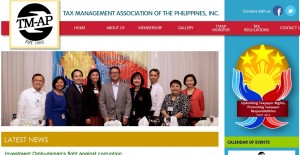Individuals and businesses may start seeing their everyday budgets increase if Congress heeds calls for the reduction of income tax rates to bring them at par with regional standards.
The Tax Management Association of the Philippines (TMAP), which represents the country’s accountants, lawyers and other professionals dealing with tax issues, this week said lower rates would give ordinary citizens higher disposable incomes.
Businesses will also benefit with the lighter tax burdens making them more competitive in the region.
“The reduction in tax rate and the adjustment in tax bracket will help increase disposable incomes of individuals,” TMAP president Rina Manuel said in an interview Wednesday. “That turns into consumption and helps create a multiplier effect for the economy,” she explained.
In a position paper this week, TMAP called for cuts in corporate and individual tax rates in the country. The simplification of the country’s tax regime was also urged to make it easier for businesses and self-employed professionals to be more honest with their dues.
The paper was submitted to Sen. Sonny Angara and Rep. Miro Quimbo, heads of the ways and means committees of their respective chambers of Congress.
For ordinary employees, TMAP said the country’s top earners should be taxed 30 percent—at most—of their gross incomes. TMAP said a tax rate somewhere between 20 and 30 percent would be appropriate and would be more in line with regional standards.
This change should be done, the industry group said, “in order to make the Philippine workforce more competitive with its (Southeast Asian) neighbors.”
Under existing laws, ordinary employees are taxed progressively according to their salaries. Those earning at least P500,000 a year—the prevailing threshold for the top tax bracket—are taxed at 32 percent. This is significantly higher than Malaysia’s 11 percent, Thailand’s 10 percent, Vietnam’s 20 percent and Singapore’s 2 percent.
At the other end of the tax spectrum, those at the lowest tax bracket should not be charged income taxes at all, TMAP said. Currently, individuals who earn P10,000 a year are charged 5 percent.
The group likewise said it was high time that tax brackets be adjusted based on inflation. This would mean an upward adjustment in the threshold for tax payers from the current P500,000 a year.
For corporations, TMAP said the current tax of 30 percent of gross income should be reduced to somewhere between 20 and 25 percent—again, putting it at par with rates in other Southeast Asian countries.
Last week, the World Bank likewise suggested a reduction in income taxes to reduce the burden on businesses and households.
TMAP likewise suggested that the income taxation of individuals be simplified to enhance compliance and help broaden the tax base. This simplified structure, involving gross income taxation, flat taxation for self-employed individuals and professionals, and minimum income taxes, among others, would require further study and consultation with the affected sectors, TMAP said.


